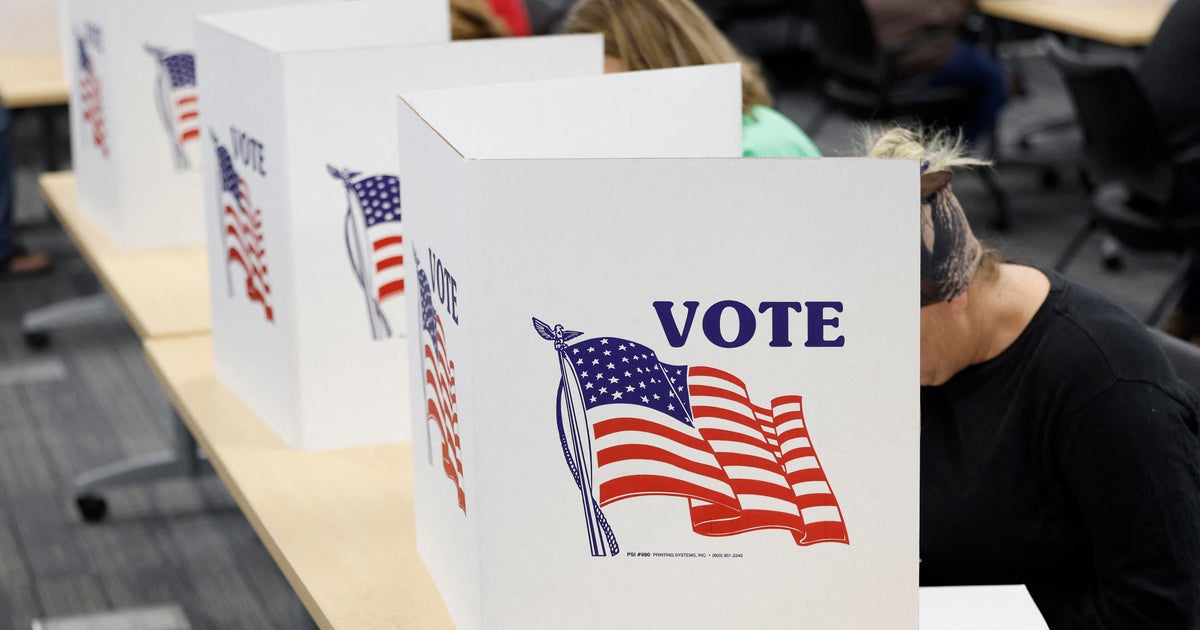CBS News
House Republicans sue Attorney General Merrick Garland, seeking Biden audio

Washington — House Republicans filed a lawsuit against Attorney General Merrick Garland on Monday as they seek audio recordings of President Biden’s interview with special counsel Robert Hur as part of their impeachment inquiry.
The House Judiciary Committee’s lawsuit in the U.S. District Court in Washington is the latest escalation in the fight over the audiotapes of Hur’s interview with the president and the ghostwriter of his book, Mark Zwonitzer. Hur interviewed both men as investigated Mr. Biden’s handling of classified documents.
The committee says it needs the audiotapes “because they offer unique and invaluable insight about information that cannot be captured in a transcript, such as vocal tone, pace, inflections, verbal nuance, and other idiosyncrasies,” according to the lawsuit. Lawmakers asked the court to order the Justice Department to hand over the material.
Samuel Corum / Getty Images
Hur declined to seek criminal charges against Mr. Biden for his handling of classified materials that he kept after serving as vice president, saying the evidence did not establish beyond a reasonable doubt that Mr. Biden violated the law. The special counsel made a number of observations about the president’s memory that enraged the White House and provided political ammunition to Republicans.
“Audio recordings are better evidence than transcripts of what happened during the Special Counsel’s interviews with President Biden and Mr. Zwonitzer,” the lawsuit said. “For example, they contain verbal and nonverbal context that is missing from a cold transcript. That verbal and nonverbal context is quite important here because the Special Counsel relied on the way that President Biden presented himself during their interview — ‘as a sympathetic, well-meaning, elderly man with a poor memory’ — when ultimately recommending that President Biden should not be prosecuted for unlawfully retaining and disclosing classified information.”
The Republican-led House voted last month to hold Garland in contempt of Congress after the White House asserted executive privilege, blocking him from releasing the recordings to lawmakers.
But the Justice Department declined to take up the contempt referral, citing its longstanding policy to not prosecute officials for refusing to turn over subpoenaed information while citing executive privilege.
The lawsuit argued there is “no lawful basis” for Garland’s refusal to turn over the audiotapes.
“Garland violated, and continues to violate, his legal obligation by refusing to produce to the Committee the audio recordings of the Special Counsel’s interviews with President Biden and Mark Zwonitzer when those recordings are not covered by executive privilege, and, even if they were, executive privilege has been waived,” the lawsuit said.
Republicans have argued that the president waived executive privilege when the Justice Department released transcripts of the interviews.
House Republicans are also considering other avenues to acquire the tapes, including holding Garland in “inherent contempt,” a tool rarely used in modern times. An inherent contempt vote, which is being pushed by Rep. Anna Paulina Luna, could result in the attorney general being taken into custody, but most observers consider that outcome highly unlikely.
CBS News
How much is the president paid?

The U.S. president hasn’t been given a raise in more than 20 years.
That means Kamala Harris or Donald Trump will earn the same salary as their predecessor: $400,000 a year, as specified in Title 3 of the U.S. Code, paid monthly. The president also gets an additional $50,000 for expenses (non-taxable), a $100,000 travel account and a $19,000 entertainment budget.
Of course, the nation’s commander in chief is also entitled to other benefits, not least of which is a paid-for mansion known as the White House, as a residence.
Between 1969 and 2001, the last time Congress boosted the chief executive’s pay, the president earned $200,000 annually. In a 1999 hearing on the proposed pay raise, it was noted that compensation for “one of the most difficult, demanding and important jobs on the face of the earth” had not risen in three decades, while the salaries of private-sector chief executive officers were soaring.
Government reform expert Paul C. Light testified that he supported a presidential salary increase “if only to signal that the American political system values its chief executive enough to occasionally boost the base salary.”
How much did U.S. presidents earn in the past?
Historically, the president’s annual salary was worth a lot more when taking inflation into account.
Here’s what presidents made per year during previous historical periods, according to the University of Michigan, citing Congressional Quarterly’s “Guide to the Presidency.” How much that pay is worth in today’s dollars, after adjusting for inflation and based on calculations from Officialdata.org, is noted in parentheses:
1789: $25,000 ($895,741)
1873: $50,000 ($1.3 million)
1909: $75,000 ($2.6 million)
1949: $100,000 (plus $50,000 taxable expense account) ($1.3 million)
1969: $200,000 (plus $50,000 taxable expense account) ($1.7 million)
More money in memoirs
It’s worth noting that presidents remain on the federal government’s payroll after leaving The White House too. Since 1958, former presidents have earned an annual pension, which now amounts to more than $200,000. They also get office space in a place of their choosing and travel expenses, according to the Former Presidents Act of 1958.
U.S. presidents also typically earn much more money when they leave office through book sales, speaking engagements, media deals and other lucrative endeavors.
Ulysses S. Grant was the first U.S. president to write a memoir, which he famously finished only days before his death in 1885. Virtually every modern president, with the exception of Franklin Delano Roosevelt and John F. Kennedy, both of whom died while in office, has written a memoir.
“It’s where a lot of money comes from after they have been president,” Barbara Perry, co-chair of the Presidential Oral History Program at the Miller Center at the University of Virginia, told CBS MoneyWatch. “Written memoirs have earned them millions.”
CBS News
Man dies after being “buried under hot asphalt” while trying to fix dump truck in Mississippi

Police in Mississippi’s capital said a man died Monday when he was trying to repair a dump truck and asphalt poured onto him.
Darrell Sheriff, 41, was underneath the truck working on a hydraulic line when the tailgate opened and asphalt fell on him, Jackson Police Department said in a statement. Jackson Police Chief Joseph Wade told reporters that officers found Sheriff, who was a private contractor, “buried under hot asphalt.”
“It appeared to be some type of malfunction with his dump truck,” Wade said, adding it was a “horrific situation.”
The incident occurred at AJ Materials at around 10:30 a.m. on Monday, CBS affiliate WJTV reported.
Wade said people on scene tried to help Sheriff and “he tried to fight to make it through those injuries but it was just too enormous for him to survive.”
The police chief said the incident left witnessess and family members traumatized.
Wade said that family members said Sheriff was a “good, hardworking family man who just trying to make a living.”
The police department classified the death as an accident.
CBS News
What’s open and closed on Election Day 2024? Check here before you go.

Election Day 2024 is expected to bring out tens of millions of people to their polling places, and many may also want to know what’s open or closed if they need to run errands, like shopping or getting to the post office.
While the Tuesday after the first Monday in November is designated for federal, state and local general elections, it is not a federal holiday. But some state offices will be closed, while workers in 28 states are guaranteed voting leave to take time off from work to cast their ballots.
That may leave some Americans to question whether they’ll find their local stores, banks, post offices, DMV and other services open on November 5. At the same time, some schools are closed on Election Day, partly as some educational facilities double as polling stations.
Are banks open on Election Day 2024?
Yes, banks and ATMs will be open on Election Day, given that it’s not a federal holiday, nor observed by the Federal Reserve system.
Wells Fargo, Citi and other major banks will be open on Nov. 5, according to their schedules. However, those banks and others will be closed Nov. 11, due to Veterans Day, which is a federal holiday.
Is the Post Office open on Election Day 2024?
Yes, the U.S. Postal Service will be open on Nov. 5 because it isn’t a federal holiday.
The USPS will also be delivering ballots mailed ahead of Election Day, although the postal service recommended that people who are voting by mail post their ballot by Oct. 29, or last Tuesday, to ensure timely delivery.
USPS workers will be delivering regular residential and business mail on Nov. 5, while its stores and other locations will be operating with their normal hours.
Is the DMV open on Election Day 2024?
Some states recognize Election Day as a public holiday, which means some offices there, including Department of Motor Vehicle offices, may be closed on November 5. U.S. states where DMV locations will be closed on Nov. 5 include:
- Delaware
- Illinois
- New Jersey
- Virginia
- West Virginia
Other municipal; offices could also be closed in these and other states or cities that observe Election Day as a holiday. For instance, New York state and city courts will be closed on Nov. 5, as well as New York City offices.
Are any retailers closed on Election Day 2024?
Stores are generally open on Election Day given that it’s not a federal holiday. Among those that will be open are Costco, Walmart and Target.
However, some stores may have modified hours to accommodate workers who are voting. For instance, Bath & Body Works locations will open at noon on Nov. 5, rather than the retailer’s regular 10 a.m. opening time.
Are bars and liquor stores open on Election Day 2024?
Yes, bars and liquor stores are open on Election Day, although that wasn’t always the case in some states.
South Carolina repealed its ban on liquor sales on Election Day in 2014, with the state joining the rest of the nation in permitting spirits and other drinks to be sold on voting day.
That ban, which dated to the 1800s, was designed to reduce bribery and corruption during elections, Reuters reported. Election Day bans on alcohol sales were once common in the U.S. because of fears that politicians would buy votes by providing drinks, according to the New York Times









